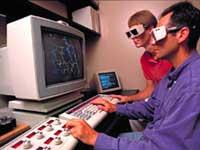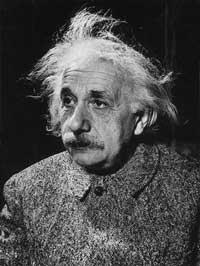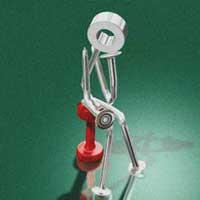Fast children of special character
2001/12/24 Kortabarria Olabarria, Beñardo - Elhuyar Zientzia

At the age of five, Dan Glück sent a letter to the government of Israel. He proposed a series of solutions to solve the Palestinian problem. The official who received the letter visited Dan Glück and was surprised to see that the sender was a child. Today, ten years later, this child studies at a special school in Jerusalem, able to involve any mathematical expert in problems.
The education of children with high intellectual quotient is new in the educational field. Previously it was thought that it could be molded by itself, for this they had a high intellectual quotient and that thanks to its high intellectual quotient would not have difficulties of adaptation. Experience says no, you have to pay special attention to them. In fact, these types of children are more likely to suffer depressions, complexes, adaptation problems... Reason: the creative character that you cannot create becomes sick.
Not only that, children with a high IQ suffer more than they enjoy. They are able to respond faster and better than the rest, so they are usually rejected by their peers. Nor are they comfortable for teachers. In this way, the self-esteem of these children is slowly lost, they try to hide their real capacity, they can change their personality…
They are able to be more sensitive than the rest, they can use more imagination, they have the opportunity to worry about the environment and to provide solutions to the environment, but for that to happen they have to feel good... finally, have to offer them the education that corresponds to them. In any case, the debate is broad: Do you need factories to make geniuses or happy young people? It seems that everyone agrees. "The goal of fast boys and girls must be to achieve social integration, to find the balance, since only this way can develop all their creativity and, in the future, thus will succeed, luckily, be a genius."

They are only words, since in reality in many countries attitudes favorable to factories of genius have been imposed. The one in Jerusalem mentioned above is one of them, but there is more. In Russia, for example, the city of Novossibirsk is famous, to which only the winners of the Olympics of knowledge held annually in Russia attend. In the United States, China, Mexico or Bulgaria there are more examples.
Extraordinary talents, geniuses, rapids…
The debate is not new: Are geniuses born or made? Throughout history opinions and theories have been developed in favor of both ideas. Research has also been conducted, more than one, but no conclusive conclusions have been drawn. For science, the functioning of the human brain continues to hide many secrets.
Definition of genius: "Anyone who does a great effective work that affects others for a long time" or, more or less, "he who does a genius job in any field." From these definitions, the category of genius can include very diverse people. Without going any further, anyone, much or little, has been considered a genius.

However, those who investigate extraordinary talents do not fully agree with these definitions. To begin with, they try to use the word genius as little as possible. Instead of using the word genius, psychologists prefer high-level expression. They have also said that it is a project: anyone who, regardless of age, is able to do something surprising. And the intelligent child is called who is able to do something earlier than usual, that is, start walking, talk, draw… before everyone else. Finally, extraordinary talent is defined with a high intellectual quotient — more than 130 —, intrinsic motivation, sensitivity and curiosity to learn, and good creative ability.
According to these definitions a gradation of intelligence is expected, but without any connection. That is, the fast child does not have to become a special talent, having a great intelligence quotient does not mean that he becomes a genius… In other words, Mozart was able to make music for five years, but at the same age Einstein almost did not know how to speak, but both are considered geniuses.
Why from two people with similar abilities and characteristics, one becomes a genius? And the other why not? Psychology has the answer: "In addition to intelligence and the ability to create, there are other factors in creating genius: identity, environment, working conditions and, among others, the effectiveness of work."
Be born and do?
Therefore, it seems that to be genius it is not enough to be born with those characteristics, geniality can be from birth but it must be worked. But this has not always been so clear.
In the 70s of the last century, theories in favor of the environment gained strength, leaving aside genetic factors and emphasizing the environment. It was then said that working properly could increase anyone's intellectual capacity.
Today, however, the current has prevailed among those who highlight the importance of the gender-educational pair.

However, it is clear that intelligence is something that comes in genes. Quotient intelligence is the result of a group of genes. Knowing the intellectual quotient of parents, today you can predict the intellectual quotient of the child. Even if the child is adopted as a child, the intellectual quotient does not change. To reinforce this theory, experts have found that the ability to speak is the best thing from generation to generation, better than the capacity for memory and association, among other things.
But these data are only evidence; we have to do deeper studies, because in attempts to relate intelligence with anatomical agents: brain size, weight, volume, etc. no definitive diagnosis has been made. Marian Diamond and Arnold Scheibel had the opportunity to investigate Einstein's brain. Both could see that in Einstein's brain there were four times more oligodendroglio than usual, that is, more cells that make the transmission between neurons. However, it remains to be seen whether the results of this research are valid for all.
More research has been done. According to some of them, there is a close relationship between the electrical response and the intellectual quotient to stimuli, that is, the responses of the great mental quotients are more complete and change less. Other studies claim that the more intelligence the brain has the better it uses energy, since it reduces the amount of neurons it puts at work. In addition, brain researchers have highlighted that most of those considered geniuses are left. According to this, he dominated the right hemisphere of the brain, more intuitive than the left. However, this means nothing, since the key does not depend on how the neural system is, but on what is used of intelligence.
Therefore, the idea of producing geniuses is still a utopia. Although much progress has been made in genetic matters, the improvement of genetic engineering to this extent remains science fiction. It seems, therefore, that in the short term genius factories cannot be built. As before, nature creates it.
Club of Geniuses

It is said: who has not ever considered himself a genius? More or less everyone. However, there are geniuses that we all accept, that received recognition from the whole society and that continue to receive it. Not everyone else will be on this list, but there are undisputed geniuses. They form the club of geniuses.
- Beethoven, Ludwig Van (1770-1827). Together with Mozart, he has faced the best musician of all time. Despite tastes, it is clear that no one has improved their symphonies.
- Confucius (BC) 551-479). Chinese thinker. Despite the centuries, in China their ideas remain alive.
- Curie, Marie (1867-1934). At a time when the role of women was practically marginalized in society, she was able to do enormous scientific and research work. It opened new avenues for women. His research on radioactivity brought him two Nobel laureates.
- Da Vinci, Leonardo (1452-1519). In nothing he became one of those experts, but in many areas he was very good. He was ahead of his time. For example, newly opened the bridge designed five centuries ago near Oslo, which could not be built in its day.
- Edison, Thomas (1847-1931). He benefited greatly from his work. Patented more than 1000 instruments.
- Einstein, Albert (1879-1955). The most important physicist in history. He was a pioneer and managed to change the foundations of physics that was still in force in his day.
- Freud, Sigmund (1856-1939). We still have a lot to say. He spent his entire life researching the human brain and was able to create a new science.
- Galilei, Galileo (1564-1642). He affirmed the theory of Copernicus earth movement with the help of the telescope. The society of the time did not accept with good eyes his discoveries and the inquisition discarded him.
- Hippocrates (BC) 460-377). He was the father of medicine.
- Michelangelo (1475-1564). The greatest artist lived in the Renaissance.
- Mozart, Wolfgang Amadeus (1756-1791). It cannot be said precisely, but it may be the best musician that has emerged in the history of humanity, especially if you look at the fact that things have been done since very young.
- Newton Isaac (1643-1727). He has been created the foundations of physics for several centuries. Inventor of the law of gravity.
- Picasso, Pablo (1881-1973). He was the creator of Cubism, which opened its doors to contemporary art and later had a great influence.
- Pythagoras (BC) 580-500). He created the foundations of mathematics.
- Shakespeare, Willian (1564-1616). Important theatrical writer. Shakespeare's works have been played in every theater in the world.
- Van Gogh, Vincent (1853-1890). Thanks to his work the doors to expressionism were opened, but, in addition, his life was totally great.

The top list is open. Have the geniuses finished? Who knows. Society probably needs a post-mortem vision in order to value human work. The XXV shows the music of Elvis Presley or Beatles. century? What will they say for Spielberg? Will the inventors of the chip or the authors of the Big Bang theory be classified as genius?
The genius of the house?
Do you think the little one in the house is faster than normal? Better than the rest? Learn better and faster than others’ Does doubt arise? Do you think it can be super fast? If so, your child should have at least the following characteristics:
- Do not sleep.
- He has learned to read in a very short time.
- Six months later he said his first word.
- With one year he has completed his first sentence.
- Between 18 and 24 months is able to complete the conversation with a high lexicon.
- For two and a half years he learned the alphabet and is able to count to the tenth.
- It is able to add and subtract from memory up to 10 years.
- At age three he asks about the meaning of words he does not know.
- Since very young he has asked deductive questions.
- High creative capacity.
- Shows great sensitivity to the environment.
- He is concerned about issues of justice and ethics.
- He is vigorous and confident.
- He wants to learn new things.
- It is very critical.
- High concentration capacity.
- He likes to walk with seniors.
- Low self-esteem, tendency to depression.
- At school he gets bored.
- It is easily distracted.
- Thought builds it itself and draws its consequences.
- Teachers don't like it much.
- He believes that people do not understand.
- It is very independent, silent.
If your child is like that, you can go to associations that group fast children with high IQ. The address of two of Euskal Herria is as follows:
- Garatu (Basque Association of Extraordinary Talents and their parents). Vitoria-Gasteiz, 945 28 90 14. Bilbao 94 447 31 97.
- ANAS (Asociación Navarra de Talento Extraordinario). Pamplona, 948 34 44 27.
Characteristics of genius

Science put people with extraordinary talent from the beginning, often at the border of madness. Extraordinary geniuses have certain characteristics that do not have the rest. So, on more than one occasion the geniuses have been considered crazy.
Analyzing and understanding the brain of normal people should not be easy, that of geniuses has to be even more difficult. Because genius cannot be easy, having normal relationships with others, knowing that they have less ability to reason.
However, the collection of studies on geniuses has allowed to establish certain characteristics of geniuses. These are:
- Sensitivity. It cannot be genius if there is no ability to ask about things, if there is no curiosity. At age 4 Einstein asked why compasses always go to the same point and Newton began to think why apples fell.
- Ability to think for yourself. Their reasoning is sufficient, they do not need others.
- Sustainability. Work on what they like, enjoy by increasing knowledge. They don't give much importance to empowerment or to making more money.
- Motivation to work. Related to the above.
- High self-esteem. Balanced in emotions. When not, creativity becomes difficult. That is why many of those who are capable stay on the road.
Despite these basic characteristics, researchers have failed to develop genius profiles. When one of the aforementioned characteristics is not met, even if it has a high intelligence coefficient, it is possible that the person is not perceived at all.
Published in D2 section of Deia.

Gai honi buruzko eduki gehiago
Elhuyarrek garatutako teknologia




